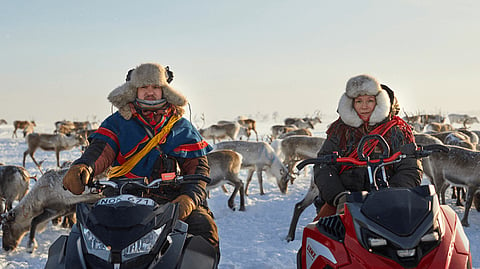Stolen Movie Review: Intense and depressing film about indigenous rights and a fight for justice
Stolen(3.5 / 5)
Adapted from Ann-Helen Laestadius' book, Stolen makes for an intense and timely watch. Based on Sweden's indigenous Sámi community, it narrates in long and painful detail their struggle for survival. Traditional reindeer herders for centuries, their minority community's livelihood is at stake owing to climate change and the financial viability of the profession in the modern world. If that isn't depressing enough (where your whole identity is under threat owing to circumstance), there's also the matter of dealing with xenophobes and bigots who spread fear and hatred. Elle Márjá Eira's fantastic film is relevant now more than ever, where indigenous communities the world over are being threatened for their mere existence, and their special/protected status being called into question. Stolen is a universal story that can be compared thematically to the fight for minority and indigenous rights on a planet that is tilting towards extreme majoritarianism with each passing day. Robert Isaksson (Martin Wallström), the narrative's primary antagonist complains about why "they" (the Sámi community) should receive all the subsidies. "My family received nothing. We had to work hard to earn all that we have today." He complains about not being able to use his snowmobile on their side of the land so as not to scare off the reindeer. He employs racial slurs like Lapp and Lappi while referring to the Sámi. The man even makes a ridiculous claim to the local police department about the community killing their own reindeer to concoct a conspiracy. It's a story of intolerance as old as time, but one that is sadly familiar. Instead of attempting to understand the other for a way of life dissimilar to your own, you're taught to be wary, to be afraid. The seed of distrust (that eventually leads to hatred) is often inculcated in the early years of childhood.
Director - Elle Márjá Eira
Cast - Elin Kristina Oskal, Martin Wallström, Robert Lars-Ante Wasara, Magnus Kuhmunen, Risten-Alida Siri Skum, Pavva Pittja
Streaming On - Netflix
The young Elsa (a fine cameo courtesy Risten-Alida Siri Skum) learns these harsh truths at school. She is excluded because she is different. Her mind is set on becoming a reindeer herder, even as her father contemplates the future. Climate change threatens their survival, and he wonders if it's worth all the trouble on his daughter's behalf. Despite the mounting challenges, she is shown the ropes: how to wrangle the animal, mark the calf to differentiate it from the herd. She picks up a valuable lesson along the way: you don't own the reindeer, you only take it on loan. When her beloved calf is killed in front of her eyes by a man in a snowmobile, her whole world changes. A now adult Elsa (Elin Kristina Oskal) continues to herd, with the reindeer killings that adversely affect her community more common than ever. The police categorises the animals as "stolen" as the carcasses remain untraceable.
The makers, the cast and the crew have a lot to be proud about. Creating a hard-hitting film that doesn't get preachy or didactic is far from easy. The story of discrimination is first seen from the eyes of an intelligent child, then a thinking adult. Stolen delves not just into indigenous rights but gender too. At council meetings, Elsa speaks up of the issues being faced by her people even as the Sámi community leaders choose to stay diplomatic. She is accused of being radical and is banned from attending meetings when all she's asking for is to be treated fairly, sans bias. Her outspoken nature is connected by the elders (all men) to the recent spate of hatred being directed at their people. Strangely, even her father, one of her biggest supporters, isn't in favour of the way in which she is going about trying to get justice. Elsa even contemplates leaving her life of reindeer herding and school teaching behind to study at university.
In all of this, there are personal problems to contend with. Elsa's grandmother is in the early stages of dementia and her brother (also a herder) is using liquor to combat a deep depression borne from the general circumstances. Stolen is real, visceral, sometimes more than one can handle. Apart from being a deep and thought-provoking film, it is shot gorgeously. Doesn't hurt to have such a magnificent landscape at your disposal, either. Cinematographer Ken Are Bongo's frames are something to behold. Aerial shots of immense snow-covered expanse and hundreds of circling reindeer, and the inimitable green-tinged northern lights create an aura that is second to none.
The natural beauty, however, never overshadows the events of the film. Told in an earnest, relatable manner, it's a universal story that transcends its geographical limitations. A special mention goes out to Elin Kristina Oskal and Risten-Alida Siri Skum for portraying versions of Elsa. The most important statement the film makes is that the indigenous Sami community has stake to the land they have been living off for generations, long before the colonising order of the new world took effect. A must watch, goes without saying.

